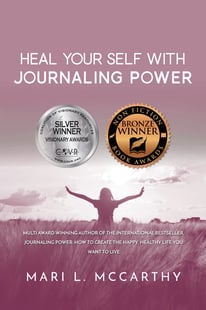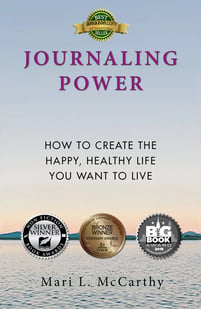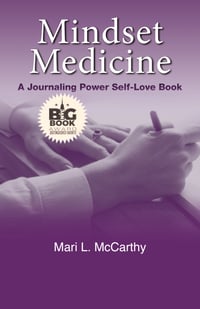Stress is an unfortunate part of everyone’s life in one way or another. Stressors at work, at home, within the self, or in relationships lead to physical and mental symptoms, such as increased heart rate, trouble sleeping, and irritability. Anxiety is the long-lasting, persistent cousin of stress. Even in the absence of stressors, people experience adverse effects.
Anxiety is not uncommon. In fact, anxiety disorders are the most common mental illness in the U.S., affecting 40 million adults — and that only includes the people diagnosed. That number could be even higher.
The effects of stress and anxiety can be troublesome. However, it’s important to remember that
your body is simply trying to protect you from external threats. While this may be hard to conceptualize in moments of extreme stress, there are ways to cope. In particular, journaling can be a fantastic tool for dealing with stress and anxiety — before, during, and after experiencing symptoms.
Types of Journaling and How They Can Help
When people think of journaling, they typically picture a teenager frantically scribbling out their feelings in a diary with a lock. While this is certainly one way of journaling, it isn’t even close to the only way. Everyone who experiences stress can benefit from putting pen to paper, fingers to keyboard, or voice to audio recording. Find the type of therapeutic journaling that works best for your specific situation.
Freewriting
One of the fundamental ways journaling helps you cope with stress and anxiety is by providing a release for negative thoughts and emotions. Often, anxiety and stress manifest as a whirlwind of racing thoughts, overwhelming worries, and a sense of helplessness. However, writing down these thoughts allows you to externalize and process them, preventing them from becoming overwhelming.
Just put pen to paper — or whatever medium of journaling you choose — and see what flows from your thoughts to your journal. Freewriting can then be a therapeutic tool to explore the causes of stress and anxiety. By delving into the underlying triggers and examining the emotions associated with them, you can gain valuable insights that contribute to your overall well-being. Before freewriting, your anxious thoughts are likely jumbled together and hard to make sense of, but you can pick out specific patterns and causes when they are recorded in a tangible way.
Creative Journaling
If writing out your own feelings is difficult for you in some way, it may be helpful to approach journaling more creatively. If you feel as though writing isn’t your strong suit or you are having trouble putting emotions into words, there are other ways to express yourself. Creative journaling can include fiction stories that revolve around a similar situation that you’re going through. You can also journal using various art forms, such as collages or doodles. Let your imagination run wild in a way that it wants to express yourself most freely.
Situational Journaling
Also known as keeping a thought diary or personal journaling, you can really tailor your journaling to your specific situation. Situational journaling allows you to record your thoughts and feelings in the moment. Audio journaling is particularly useful in moments of spiraling thoughts or overwhelming feelings. Recording thoughts and feelings in your own voice can provide a sense of comfort and connection. It allows you to express yourself freely, unburdening your mind while engaging in a different sensory experience. Audio journaling can be particularly useful if you struggle to find the right words when writing or prefer a more conversational approach to self-reflection.
You can press record and:
- Regain control by breathing and grounding yourself with physical reminders;
- Describe the current situation including the actual events, people involved, and what parts triggered you;
- Figure out the desired outcome, including how you want to feel or how you would expect others to handle this situation;
- Decide how to act by taking a minute to reflect and choose your next behaviors mindfully;
- Acknowledge unhelpful reactions, including ones you are currently having or have had in the past.
By talking or writing these steps out, you can prevent your thoughts from spiraling into unhelpful actions. Then, you also have a record of how you handled a situation to look back on for inspiration or improvement. Even if it’s not the same situation, many forms of anxiety can benefit from the same strategy.
One particular form of anxiety that can significantly impact individuals is medical anxiety. This refers to the fear or worry associated with medical procedures, doctor's visits, or general health concerns. Journaling can be a powerful outlet for expressing feelings related to medical anxiety, providing a safe and judgment-free space to process emotions. By articulating these fears and concerns on paper, you can gain a sense of relief and clarity, allowing you to better understand and manage your thoughts and anxieties.
Gratitude Journaling
Anxiety and stress can cause you to focus heavily on the negative. This is, of course, helpful when processing emotions and figuring out advantageous moves to make in each situation. However, you can counteract all of this attention on the negative aspects of your life by keeping a gratitude journal. Even if it’s just one line a day, you can make it a habit to document what you are grateful for to bring perspective and train your brain to look at the positive things more often.
Habit Tracking
Speaking of forming helpful habits, you can also use journaling to keep tabs on those habits. In addition to writing or speaking your thoughts, you will likely also employ other means to cope with stress and anxiety, such as breathing exercises, or setting aside time for meditation or to go on walk. Create a dedicated space in your journal to track habits like exercising, healthy eating, and sleep patterns. This can help you set goals and give you perspective on how well you’re meeting them.
Tips and Prompts for Anxiety and Stress Journaling
To effectively use journaling as a coping mechanism, it can be helpful to utilize writing prompts specifically tailored for anxiety and stress. Cognitive behavioral therapy typically incorporates some form of journaling
Try asking yourself questions like:
- What are my beliefs about this situation?
- How can I keep myself safe in this situation?
- Is this situation something I can control?
- What would happen if I let go of control in this situation?
- Am I using emotional or logical reasoning?
- What are the possible consequences of my actions?
- How can I reframe negative thoughts about this situation?
These prompts serve as a starting point for self-reflection and allow you to explore your emotions and thoughts surrounding stress and anxiety. The key is to approach journaling with an open mind and a willingness to explore your feelings without judgment.
Moving Forward
Journaling is a versatile and accessible tool that can greatly assist in coping with stress and anxiety. Whether through traditional writing, digital notes, or audio recordings, journaling offers a safe space to release negative thoughts, explore emotions, and develop self-awareness. By incorporating writing prompts tailored for anxiety and stress, you can delve deeper into your experiences and discover effective coping strategies.
Journaling empowers you to take an active role in managing your mental well-being, providing a valuable resource in times of stress and anxiety. So grab a pen and paper, an aesthetic notebook, or your preferred recording device and embark on a journey of self-discovery.
 Author bio: Miles Oliver is an independent writer with a background in business and passion for psychology, news, and simply helping people live happy and fulfilled lives. He has lived and traveled all over the United States and continues to expand his awareness and experiences. When he is not writing, he is most likely mountain biking or kicking back with a cup of tea.
Author bio: Miles Oliver is an independent writer with a background in business and passion for psychology, news, and simply helping people live happy and fulfilled lives. He has lived and traveled all over the United States and continues to expand his awareness and experiences. When he is not writing, he is most likely mountain biking or kicking back with a cup of tea.
Journaling Power Revolution Series






Leave Comment